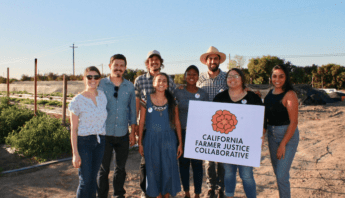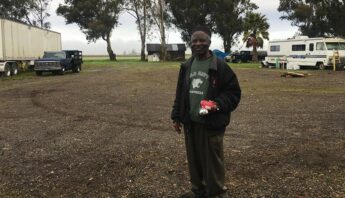Most Californians would be surprised to learn there are over 700 African American farmers in the state.
Most Californians would be surprised to learn there are over 700 African American farmers in the state. African American farmers are largely undetectable in California’s 580 farmers markets, except the Freedom Farmers’ Market in Oakland.
As one of the organizers of the Freedom Farmers’ Market, I celebrate a new state policy, AB 1348, which would create more opportunities for African American farmers and other farmers of color to receive equity in the distribution of California’s agricultural resources. Resources historically available to white farmers have not been there for farmers of color. If it passes through the State Senate next month, the “Farmer Equity Act” will recognize the historic systemic wrongs faced by farmers of color — those at the core of building and sustaining our farming communities.
We came to California looking for a better life
African Americans farmers and ranchers have persisted in California since at least 1908. Colonel Allen Allensworth and four others migrated west, establishing Allensworth, California as a refuge for black families to plant seeds of hope for future generations. By 1914, Allensworth had a school, its own school district, a hotel, a church, a library, and of course, farmers and ranchers. Forming towns like Allensworth were a necessity because a racialized society existed, even in the free state of California.
Unfortunately, in Allensworth — like so many African American enclaves across the country — their aspirations were short lived.
Allensworth, in the Tulare Valley, was once a thriving community. Because of its beginning, other African American families migrated into California’s valleys from the Southern states in the 1930s, 1940s, and 1950s. Some of these early pioneers of color, like the citizens who built Allensworth, later moved into Fresno, Bakersfield, Delano, Modesto and other towns nearby. Farmers migrating from other countries have also settled into these valley communities of Fresno, Bakersfield and Delano and planted their dreams too.
Perhaps one of California’s best-known African American farmers is Mr. Will Scott, Jr., President of the African American Farmers of California Association. Like so many other African American families migrating west, as mentioned in The Warmth of Other Suns, Mr. Scott, Sr. moved his family into Fresno, migrating from Oklahoma in the 1950s with hopes of a better life.
Even after the Great Migration and gaining land, numerous African American families lost their urban land and farms due to severe racialized physical and economic violence beyond their control. The Farmer Equity Act (AB1348) is a call for legislators to acknowledge the essential contributions and sacrifices that farmers similar to Will Scott, Jr. make everyday for California’s agriculture. He and other farmers of color sell their produce at the Freedom Farmers Market in Oakland.
Removing Black communities
Growing up in the 60s in Daytona Beach, with parents who had migrated from southern states, I remember going to segregated elementary schools and receiving my early elementary education from all-black teachers and principals. Even as I saw my hometown neighborhoods as sanctuaries of safety, our community members knew what waited for us outside the confines of our protected communities and gave us extra nurturing. In our community, the next-door neighbors, school bus drivers, schoolteachers, the deaconesses, the choir directors, Sunday school teachers and hairdressers all nurtured us in the way that African American farmers nurtured the seeds that framed their early communities like Allensworth, CA. African American farmers helped those early towns thrive. The farmers maintained the memory and practice of indigenous foods, thereby preserving food culture and community ways.
From the 1865 to the 1920s, African Americans began acquiring titles to land through hard work and savings. At one point they owned over 15 million acres of land. Tragically, most of this land was lost.
From Florida to California, African American rural and urban communities systematically experienced the same defeat — losing community-owned land and that essential sense of place because of federally mandated policies. In Florida, urban “development” policies were successful in destabilizing the business district where my grandfather’s restaurant was located in Daytona Beach. Truman’s Housing Act of 1949 started “urban renewal” resulting in the destruction of over 2000 black communities during the 1950s and 1960s. Daytona Beach was one of those intact black communities. James Baldwin ‘s remark that “urban renewal means Negro removal,” expresses the truth for those of us who experienced the loss of community.
Decades of systematic neglect
The lost years of family history, loss of earning potential through lack of inheritances, and generations of neglected educational opportunities, have placed African American farmers far, far behind the American starting line. That the U.S. Department of Agriculture neglected the needs of African American farmers and other farmers of color, given the historical losses experienced throughout centuries of state-sanctioned plantation agriculture, is a troubling thought.
In spite of the challenges and neglect, it was the spirit of cooperation and collectivization of resources that made survival possible for the black towns and farming communities. Yet, no amount of collectivization could prepare the farmers of color for the ever-changing demands of industrial agriculture production, without safeguards and support.
AB 1348 directs the California Department of Food and Agriculture to discontinue neglecting these farmers of color and review the programs serving farmers of color statewide.
New policy to level the field
AB 1348 is a chance to begin to level the planting fields in California agriculture for all descendants of our nation’s builders, as well as those farmers of color more recently arrived. Correcting some of the misguided and inhumane policies of the past by recognizing the struggles of farmers of color is the right thing to do now. The Farmer Equity Act recognizes, as has the federal government, that farmers of color have historically suffered.
California’s farmers of color preserve rich cultural food heritages that support our community sense of well-being. And these farmers are integral to the state’s agriculture. They deserve equity.
Please join me in urging your legislators to support AB 1348 and equity for all farmers.
Photo: Freedom Farmers’ Market







